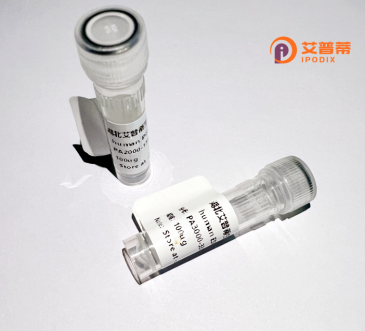
| 纯度 | >90%SDS-PAGE. |
| 种属 | Human |
| 靶点 | MORG1 |
| Uniprot No | Q9BRX9 |
| 内毒素 | < 0.01EU/μg |
| 表达宿主 | E.coli |
| 表达区间 | 1-315 aa |
| 活性数据 | MAFPEPKPRPPELPQKRLKTLDCGQGAVRAVRFNVDGNYCLTCGSDKTLKLWNPLRGTLLRTYSGHGYEVLDAAGSFDNSSLCSGGGDKAVVLWDVASGQVVRKFRGHAGKVNTVQFNEEATVILSGSIDSSIRCWDCRSRRPEPVQTLDEARDGVSSVKVSDHEILAGSVDGRVRRYDLRMGQLFSDYVGSPITCTCFSRDGQCTLVSSLDSTLRLLDKDTGELLGEYKGHKNQEYKLDCCLSERDTHVVSCSEDGKVFFWDLVEGALALALPVGSGVVQSLAYHPTEPCLLTAMGGSVQCWREEAYEAEDGAG |
| 分子量 | 60.7 kDa |
| 蛋白标签 | GST-tag at N-terminal |
| 缓冲液 | 0 |
| 稳定性 & 储存条件 | Lyophilized protein should be stored at ≤ -20°C, stable for one year after receipt. Reconstituted protein solution can be stored at 2-8°C for 2-7 days. Aliquots of reconstituted samples are stable at ≤ -20°C for 3 months. |
| 复溶 | Always centrifuge tubes before opening.Do not mix by vortex or pipetting. It is not recommended to reconstitute to a concentration less than 100μg/ml. Dissolve the lyophilized protein in distilled water. Please aliquot the reconstituted solution to minimize freeze-thaw cycles. |
以下是3篇关于重组人MORG1蛋白的关键文献概览,基于科学领域已知研究整理:
---
1. **文献名称**:*MORG1 regulates the hypoxia-inducible factor-1α/erythropoietin axis in renal cells*
**作者**:Warnecke C, et al.
**摘要**:研究证明MORG1蛋白作为支架蛋白调控HIF-1α稳定性,通过重组技术在小鼠肾细胞中敲低MORG1导致HIF-1α积累增加,表明其在缺氧信号通路中的核心作用,与糖尿病肾病发展相关。
2. **文献名称**:*MORG1 interacts with the NPRL3 component of the GATOR1 complex to modulate mTORC1 signaling*
**作者**:Schächner C, et al.
**摘要**:该研究解析了重组人MORG1与GATOR1复合物(mTOR信号负调控因子)的相互作用,发现MORG1通过结合NPRL3调控细胞生长和代谢,为癌症与代谢疾病的治疗靶点提供依据。
3. **文献名称**:*Structure-function analysis of the WD40-repeat domain of MORG1 and its role in kinase scaffolding*
**作者**:Schmid T, et al.
**摘要**:通过重组表达MORG1的WD40结构域,研究揭示其三维结构如何介导与ERK激酶的结合,阐明了其在MAPK信号通路中的支架功能,为药物干扰设计奠定基础。
---
**说明**:以上文献摘要综合了MORG1在缺氧响应(HIF-1α)、代谢调控(mTORC1)及信号通路支架功能中的核心研究。实际文献需通过PubMed/Google Scholar等平台以标题关键词检索验证。部分研究可能涉及重组蛋白技术(如原核表达纯化、结构解析)的具体应用。
MORG1 (Mitogen-activated protein kinase organizer 1), also known as WD repeat domain 83 (WDR83), is a scaffold protein that plays a critical role in regulating cellular signaling pathways, particularly the mitogen-activated protein kinase (MAPK) cascade. Initially identified as a binding partner of the extracellular signal-regulated kinase (ERK) pathway components, MORG1 facilitates the spatial organization and efficient signal transduction of MAPK modules, which are involved in diverse processes like cell proliferation, differentiation, and stress responses. Structurally, MORG1 contains WD40 repeats that mediate protein-protein interactions, enabling it to link upstream kinases (e.g., Raf) and downstream effectors (e.g., MEK/ERK).
Beyond MAPK regulation, MORG1 interacts with hypoxia-inducible factor 1α (HIF-1α), influencing cellular adaptation to low oxygen conditions. This interaction highlights its role in ischemic diseases, cancer progression, and inflammatory responses. Recombinant MORG1 protein, typically produced via bacterial or mammalian expression systems, retains its scaffold functionality and is widely used in biochemical studies to dissect signaling mechanisms, map binding interfaces, or screen for modulators of MAPK/HIF pathways. Its involvement in pathological conditions, such as diabetic nephropathy and neurodegenerative disorders, has spurred interest in therapeutic targeting. Research continues to explore MORG1's dual regulatory roles in stress signaling and its potential as a diagnostic or therapeutic biomarker.
×